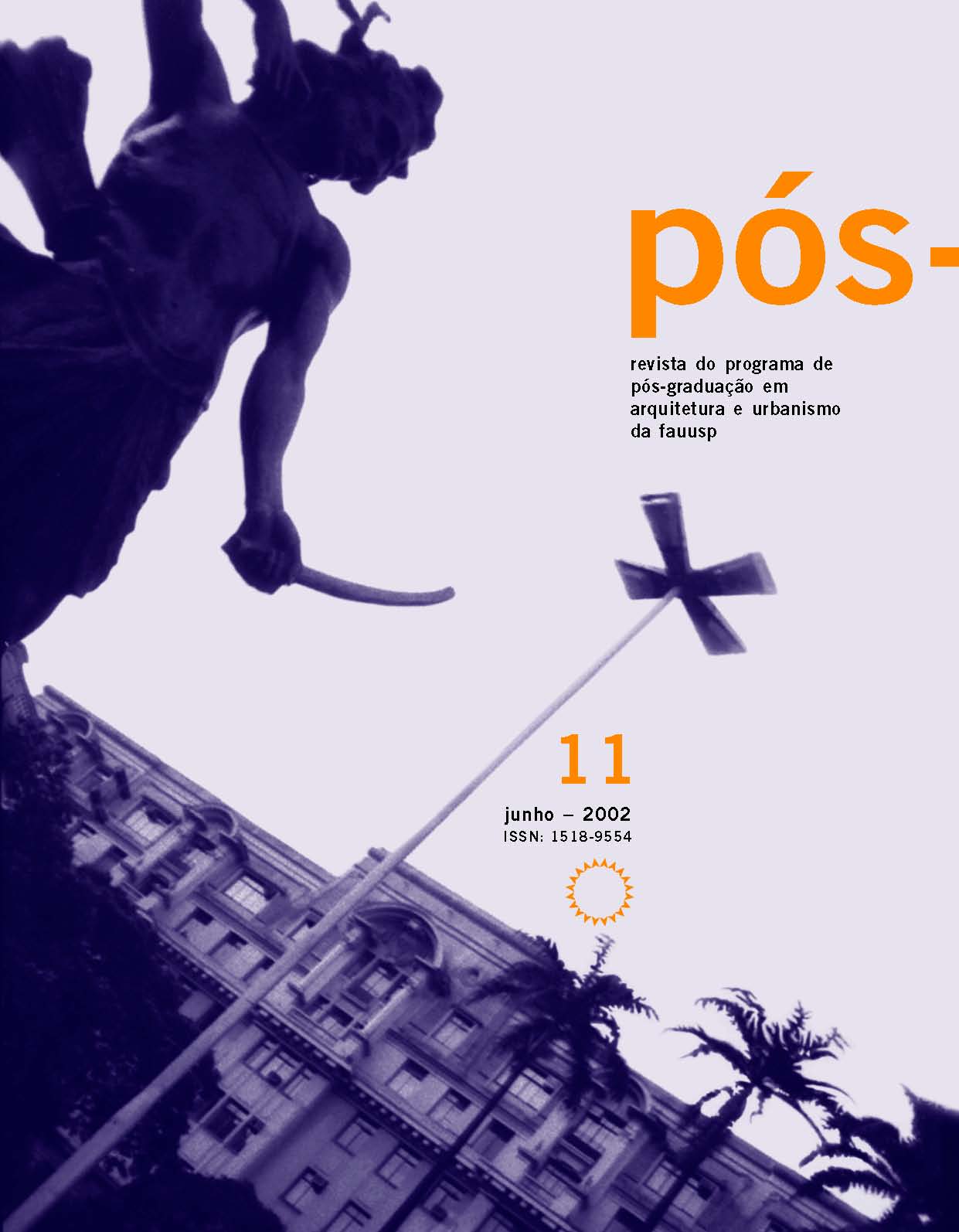[N]
DOI:
https://doi.org/10.11606/issn.2317-2762.v11i0p90-101Keywords:
Projeto, prática, revisão, crítica, arquitetura contemporânea, modernidade, modernismoAbstract
This article is an invitation to reflect on the crisis of design as the practice of autonomous creation. This assessment to design was central to the heroic practice of the modern movement, and it now supports the formalist aestheticization of mainstream architectural production that circulates in most of the specialized press and in academic and professional circles. The practice and thinking of contemporary architecture continue to face the problems of the crisis of modernity, which currently follows the parameters dictated by globalizing markets and consumption. Experimentation in early modernist design attempted to address both aesthetic and social issues critically and in an integrated manner. However, this effort lost its strength in response to a utopian and collective project inserted in the public sphere. As a result, experimentation contradictorily yielded to the consideration of architecture as a symbolic means of social differentiation and inequity. On the one hand, the critique of modernism showed the limitations and pitfalls of its utopian premises. On the other hand, the inapropriate translation of postmodern and deconstructive theories into architecture provided arguments that were coopted by the same practice of capitalist modernization that they intended to call into question. This paradoxical situation presents a new challenge to architecture as discipline and practice in a new social, economic and cultural context. The question is to revise the conception of design as an abstract representation of space, which is external to life world situations. This means to rethink design as a process of translation of conflicts and not merely as the production of aesthetic objects in themselves. The conjuncture and disjunctures of the contemporary world are different from those of the modernist avant-gardes in the beginning of the 20th century. If design today still has any critical potential, it must take into consideration the complex relationships among different social, economic, cultural and political agents and conditions. One of the main challenges to designers is the need to reelaborate their understanding of the social imaginaries that are spatialized in architecture and in the city, considering them concretely through everyday life and the present as constituent elements of the articulation between the legacies of the past and the possibilities for the future.Downloads
References
ARANTES, Otília. O lugar da arquitetura depois dos modernos. São Paulo: Edusp, 1993.
ARANTES, Otília. Urbanismo em fim-de-linha (e outros estudos sobre o colapso da modernização arquitetônica). São Paulo: Edusp, 1998.
BAUDRILLARD, Jean. Verdade ou radicalidade na arquitetura. AU, n. 84, p. 49-50, 1999.
CRAWFORD, Margareth. Blurring the boundaries: Public space and private life. In: CHASE, John, CRAWFORD, Margaret; KALISKI, John (Ed.). Everyday urbanism. Nova York: The Monacelli Press, 1999.
DOLLÉ, Jean-Paul. Longe do lugar, fora do tempo. Urbs, p. 45-48, maio/jun. 1999.
FEATHERSTONE, Mike, LASH, Scott, ROBERTSON, Roland. Global modernities. Londres: Newburry Park; New Delhi: SAGE, 1995.
FOUCAULT, Michel. Of other spaces: Utopias and heterotopias. In: LEACH, Neil. Rethinking architecture: A reader in cultural theory. Nova York: Routledge, 1997.
HARVEY, David. The condition of postmodernity (An inquiry into the origins of cultural change). Cambridge, MA: Basil/Blackwell, 1989.
HOLSTON, James (Ed.). Cities and citizenship. Durnham: Duke University Press, 1999.
JAMESON, Fredric. Postmodernism (or, the cultural logic of late capitalism). Durham: Duke University Press, 1991.
JAMESON, Fredric. The cultural turn. Londres, Nova York: Verso, 1998. LEACH, Neil. The anaesthesis of architecture. Cambridge, MA: MIT Press, 1999.
LEFEBVRE, Henri. The production of space. Cambridge, MA: Blackwell, 1991.
ZUKIN, Sharon. Loft living (culture and capital in urban change). New Brunswick: Rutgers U. Press, 1989.
ZUKIN, Sharon. Landscapes of power (from Detroit to Disney World). Berkeley: University of California Press, 1991
Downloads
Published
Issue
Section
License

This work is licensed under a Creative Commons Attribution 4.0 International License.
DIADORIM - Diretório de Políticas Editoriais












